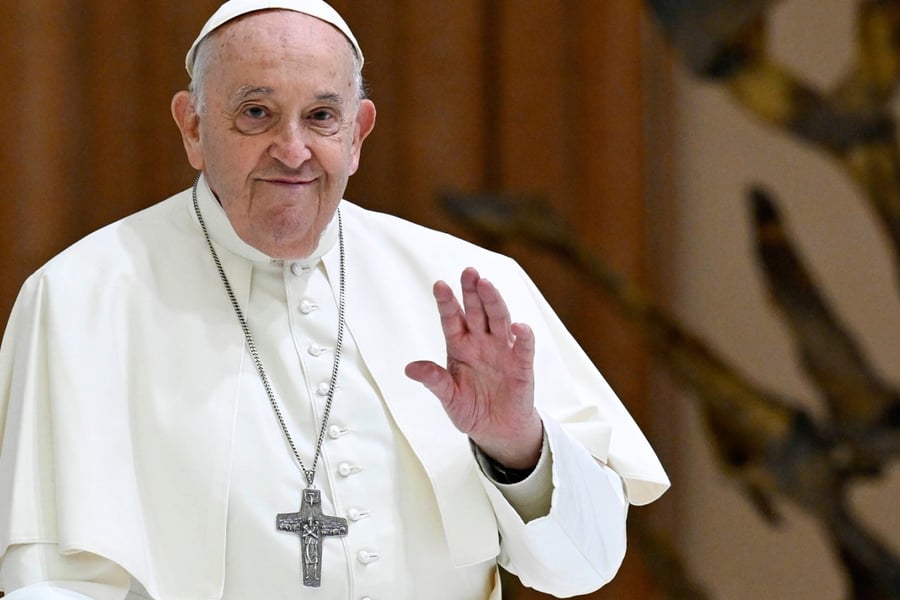Pope Francis, who made history as the first Latin American papal leader and was considered to have a more progressive approach than his conservative predecessors, died Monday, the Vatican confirmed. He was 88.
“At 7:35 this morning, the Bishop of Rome, Francis, returned to the home of the Father,” Cardinal Kevin Ferrell, the Vatican camerlengo, announced in a statement. “His entire life was dedicated to the service of the Lord and of his Church. He taught us to live the values of the Gospel with faithfulness, courage, and universal love, especially for the poorest and most marginalized. With immense gratitude for his example as a true disciple of the Lord Jesus, we commend the soul of Pope Francis to the infinite, merciful love of God, One and Tribune.″
Francis had struggled with respiratory issues through his adult years, stemming from a life-threatening battle with pneumonia he’d faced as a young man, which led to the partial removal of one of his lungs. In February, he was hospitalized due to bronchitis, which became more complicated due to an infection in his respiratory tract.
The pope made his final public appearance on Easter Sunday, a day before his death. He appeared in St. Peter’s Square to bless thousands of onlookers. Pope Francis also met briefly with U.S. vice president J.D. Vance.
In his final message, Francis shared, “There can be no peace without freedom of religion, freedom of thought, freedom of expression.” He called for an immediate ceasefire in Gaza and urged for a solution to the ongoing conflict in Yemen, noting that “the light of Easter impels us to break down the barriers that divide us.”
Born Jorge Mario Bergoglio in Buenos Aires, Francis was one of five children in a family of Italian origins. He studied as a chemical technician and held jobs working as a bar bouncer, sweeping floors as a janitor, and teaching at a high school. Eventually, he entered the priesthood and in 1958, he joined the Society of Jesuits. When he was elected pope in 2013, he became the first Jesuit and the first Argentine to ascend to the head of the papacy. He was also the first non-European pope in more than a millennium.
Love Music?
Get your daily dose of everything happening in Australian/New Zealand music and globally.
Dubbed “the people’s pope,” Francis was vocal about climate change and anti-capitalist beliefs. In May 2024, during a Vatican summit on the climate crisis, he said, “The wealthier nations, around one billion people, produce more than half the heat trapping pollutants. On the contrary, the three billion poorer people contribute less than 10 percent, yet they suffer 75 percent of the resulting damage.” Progress, he added, “is being held back by the greedy pursuit of short-term gains by polluting industries and by the spread of disinformation, which generates confusion and obstructs collective efforts for a change in course.”In 2013, Francis garnered headlines for his open-minded stance on homosexuality, a notably compassionate approach compared with the Catholic Church’s historic position on the issue. He told reporters of his stance on his priests, “If someone is gay and he searches for the Lord and has good will, who am I to judge?” At the time, his words stood in stark contrast to those of Pope Benedict XVI, who wrote in 2005 that homosexuality was “a strong tendency ordered toward an intrinsic moral evil.”
Francis also pushed the church to move away from the pomp and grandeur of traditional Catholic rituals. He embraced modest clothing and living accommodations, passing up a traditional papal apartment in the Vatican for a two-bedroom residence. At other points, he urged the Catholic religion to be more open, calling for more sympathy toward divorced couples and saying divorce could be “morally necessary.”
But while his more progressive declarations caused friction in conservative echelons of the Vatican, he left behind a mixed legacy. In 2018, after receiving criticism for defending Chilean bishop Juan Barros who was accused of covering up abuse committed by a priest, Francis apologized for his “grave mistake.” In recent years, he addressed clerical sexual abuse, meeting with survivors and making it compulsory for members to report suspected abuse. He instituted rules where abusers could be defrocked, yet as critics have pointed out, some influential clergy continued to go unpunished even after admitting to misconduct.
Though he denounced laws criminalizing homosexuality and declared that individuals in same-sex couples could receive blessings from priests, he stopped short of allowing same-sex marriage and made headlines for using a homophobic slur at a meeting in 2024. An address he gave to a university that same year ignited criticism after he emphasized motherhood and described women as “a fertile welcome, care, vital devotion.”
Despite any controversy, Francis was greeted with enthusiasm around the world, often attracting hundreds of thousands of people hoping to see him in his popemobile. He appealed to young people and acquired more than 18 million followers on his English Twitter account, although he underscored the idea that technology should be treated with skepticism.
In keeping with his philosophy of life, in 2024, Francis simplified his own funeral rites, paring down the elaborate rituals of a traditional papal funeral and opting for a burial outside of the Vatican that emphasized his role as a bishop. Funeral details have yet to be announced. The College of Cardinals is expected to convene for the conclave to select the next pope within 15 to 20 days of Francis’ death.
From Rolling Stone US



































